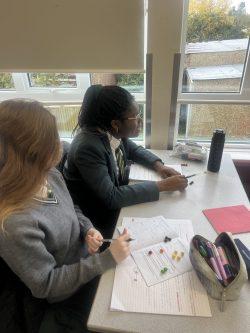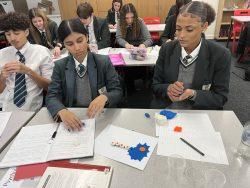Is Psychology a Science? Year 10 Take On the Debate
By Ms Gaxherri, Psychology Teacher This week, Year 10 Psychology students have been exploring one of the subject’s most fascinating questions: Is Psychology a science? To...
Filter by Category
Filter by Author


























































































































































































By Ms Gaxherri, Psychology Teacher This week, Year 10 Psychology students have been exploring one of the subject’s most fascinating questions: Is Psychology a science? To...
Posted by admin
This term in Year 10 Psychology, we have explored the topic of Social Influence – how people’s thoughts, feelings, and actions are shaped by those around them. This includes...
Posted by Holly Lloyd

Psychology: Exploring Research Methods with Skittles In Psychology, our students have been delving into the fascinating world of research methods, focusing on different types of...
Posted by admin

In Psychology, our Year 11 students recently delved into the fascinating world of neuroscience, exploring how the brain’s chemical processes can influence mental health. The focus...
Posted by admin

Miss Lloyd’s Year 13 psychology classes have been looking at how attachments form between babies and their caregivers, within their ‘child psychology’ lessons. To support them in...
Posted by Holly Lloyd

Mr Saich’s Year 13 psychologists have been learning about how attachment forms between babies and their primary caregivers. To support their learning, students were given an egg...
Posted by Saina Asadi
By Ms Gaxherri, Psychology Teacher
This week, Year 10 Psychology students have been exploring one of the subject’s most fascinating questions: Is Psychology a science?
To investigate, we looked at Pavlov’s famous experiment with dogs. Pavlov discovered that dogs could learn to associate a bell with food—a process known as classical conditioning. This gave students a concrete example of how Psychologists can use controlled experiments to study behaviour, just like scientists in other fields.
We then discussed whether psychology, as a subject, meets the key features of science—objectivity, control, and replicability. While Pavlov’s work certainly used scientific methods, students also considered whether all areas of psychology can be measured in the same way, especially when studying thoughts and emotions.
The class showed real maturity in their discussions, weighing up evidence and sharing thoughtful insights. It’s been brilliant to see them developing critical thinking skills and engaging with the subject on a deeper level.
Psychology is all about understanding people and Year 10 are well on their way to becoming curious and reflective thinkers.

Miss Lloyd’s Year 13 psychology classes have been looking at how attachments form between babies and their caregivers, within their ‘child psychology’ lessons. To support them in...